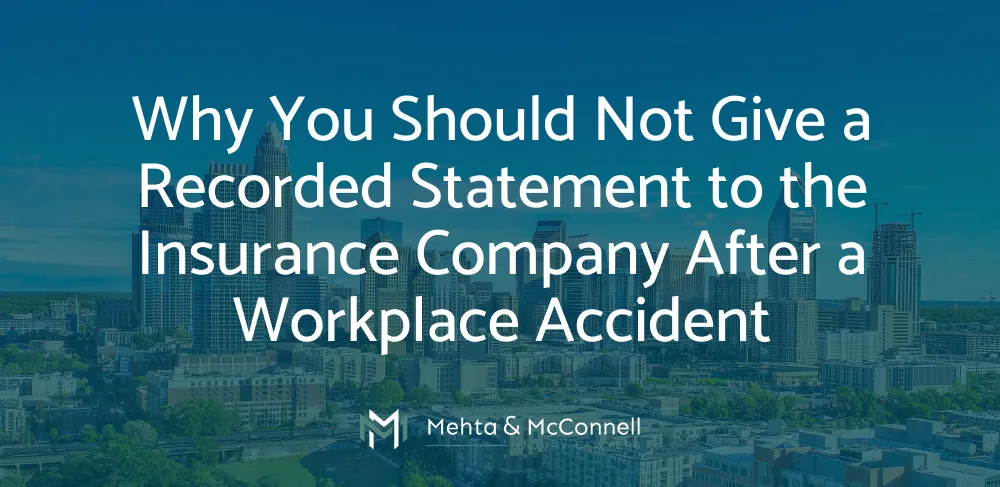 Workers' Compensation
Workers' Compensation
Following a workplace accident, many things may be asked of you, including providing a recorded statement to your employer’s workers’ comp insurance company.
You should not give the recorded statement until you speak with legal counsel. You may wonder what harm could come from complying.
This article will highlight what may go wrong and why you should proceed cautiously when asked to provide a recorded statement.
What Is a Recorded Statement For Insurance?
A recorded statement is just that. It is typically a phone conversation where the insurance adjuster will ask you questions about the workplace accident and your injuries.
The conversation is recorded, transcribed, and put into the claim file.
Do I Have to Give a Recorded Statement to the Insurance Company?
It is usually standard practice for the insurance company to request a recorded statement and a written report following any workplace accident.
In North Carolina, you generally have 30 days from the accident date to report it to your employer. You are required to report the injury to your employer within this timeframe.
If you don’t, you may lose your right to pursue a claim altogether. However, reporting the incident and recording a statement are very different things.
You should wait to provide a recorded account of the incident until you consult a North Carolina workers’ compensation attorney.
Three Reasons Not to Make a Recorded Statement
We always advise that speaking with an attorney before giving a recorded statement to your employer’s workers’ comp company is best. Here are the reasons.
1. Workers’ Comp Carriers Can Use the Statement Against You
The workers’ comp carrier can use your account of what happened to deny benefits or challenge your claim.
Whether you negotiate an agreement with the carrier or pursue a workers’ compensation claim, the insurance company will try to find a way to use what you say to its advantage.
2. It Is Easy to Make a Mistake
Remember, the adjuster on the other end of the phone works for the insurance company.
Their job is to protect the workers’ comp carrier and their insured. No matter how polite and kind they may seem on the phone, they do not have your best interest at heart.
It is quite the contrary, and these individuals are equipped to ask questions in a particular manner to get injured workers to make statements that may harm their case.
3. There Is a Margin of Error
The nature of a recorded statement later transcribed into a written one always comes with a margin of error. Often transcribed statements do not read well due to the nature of conversational speech.
It is much easier to mumble and stutter when speaking versus writing. It is also common to mistakenly say and use the wrong word or phrase.
Unlike a written statement, where you can go back and re-read it for accuracy, the recorded statement is made on the spot and is hard to change later. It can make injured workers seem unsure or untruthful if they try to change their words later.
What Not To Say To Insurance Adjuster
When providing a recorded statement, several common mistakes injured workers often make, including:
- Saying anything that implies fault (e.g., apologizing),
- Guessing rather than stating, “I don’t know,”
- Speaking about injuries and symptoms, and
- Agreeing to accept a rushed lowball settlement.
You might have to provide workers’ comp insurance with a recorded statement. But you should not do it alone or without consulting an attorney first.
You want to preserve your rights. Even a simple slip-up on a recorded line could cost you.
Never Sign Anything Without Speaking to an Attorney
Often a request for a recorded statement will snowball into demands for more information and signatures. It is imperative to never sign any documents without speaking to a lawyer first.
The adjuster may ask you to sign release forms for medical records, admission statements, settlement offers, etc. Do not sign anything or give the insurance company access to your personal information or records. Contact our team to review these documents immediately.
You may think you have nothing to hide but unknowingly sign off on documents that can damage your case later.
What to do After a Workplace Accident?
The moments following a workplace accident can be scary and overwhelming.
Understanding what to do and the steps you should follow ahead of time can help ease your anxiety and stress in those initial moments.
Seek Medical Attention
Most importantly, seek immediate medical treatment, even if you don’t think you are seriously injured.
This might involve calling 911 and being transported to the closest local emergency room via ambulance or be as simple as visiting your primary care provider.
If you do not require emergency care, your employer may have a list of designated healthcare providers you must see for treatment.
Always provide an accurate and detailed account of what happened and how the injury occurred, and keep a copy of all bills and medical records.
Report Your Injury to Your Employer
Second, you must report your injury to your employer immediately after the accident. In North Carolina, you must notify your employer of the injury within 30 days of the accident or when you became aware of the injury.
You can lose your right to workers’ compensation benefits if you fail to report the injury within the allotted timeframe.
File a Workers’ Compensation Claim
After receiving initial medical care and notifying your employer of your injury, you should file a formal workers’ comp claim to seek eligible benefits.
You must complete Form 18 and submit it to the North Carolina Industrial Commission in North Carolina. The form requires basic information about yourself, your injury, your employer, and any medical treatment.
Generally, you have two years from your injury to seek workers’ compensation benefits. You are not required to hire an attorney to file a workers’ compensation claim, but we highly recommend it.
A workers’ comp attorney will ensure the form is completed accurately and complies with requirements, and will assist with any denials or requests for additional information.
Contact An Experienced North Carolina Workers’ Comp Attorney After A Workplace Accident
At Mehta & McConnell, we founded our firm to represent individuals injured in the workplace due to someone else’s negligence.
With 30 years of combined experience—including and representing insurance companies and large corporations—we are uniquely qualified to fight for you. Contact us to schedule a consultation.

